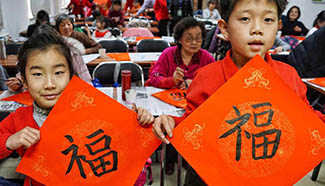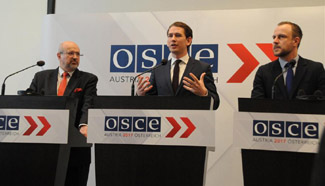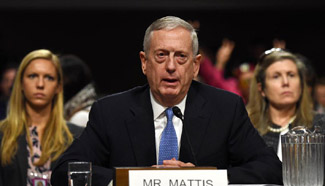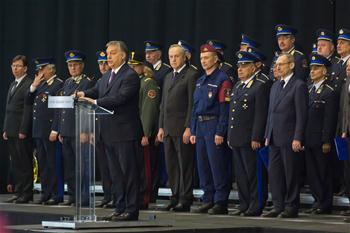BEIJING, Jan. 12 (Xinhua) -- Chinese President Xi Jinping's upcoming visit to Switzerland and his scheduled attendance at the 47th World Economic Forum (WEF) are expected to deepen China-Switzerland partnership, advance China-Europe cooperation as a whole, and reduce uncertainties through injecting confidence and solidarity into the international business community.
Xi, as a leader of a responsible power, will share Chinese governance wisdom and the concept of peaceful development and win-win cooperation, and explore ways of boosting world economic confidence and faciliate global governance reform.
INNOVATIVE TIES, MUTUAL BENEFICIAL BLUEPRINT
The Chinese president will pay the state visit on Jan. 15-18 to Switzerland, a European country that has maintained traditional friendship with China over the past six decades since the two established the diplomatic relations in 1950.
The highlight of China-Switzerland ties is innovation and creativity. The two countries established a strategic innovative partnership during then-President Johann Schneider-Ammann's state visit to China in 2016.
Switzerland has become China's first and the only strategic partnership named after "innovation," one of the five development concepts outlined in China's 13th Five-Year Plan period (2016-2020), which also include coordination, green development, opening up and sharing.
Wang Yiwei, a professor at Renmin University of China in Beijing, said the word of innovation has precisely defined the direction for the future development of the relations between China and developed countries.
"The practice that Switzerland is taking the opportunity of China's pursuit of building a new type of major-country relationship has demonstrated an example for other Western countries," he said.
Currently, China-Switzerland relationship is gaining a good momentum. More than 20 governmental dialogue and consultation systems function well, and bilateral trade volume has increased against the sluggishness and gloominess in the global economy with many achievements in economic and trade cooperation.
In 2016, China Construction Bank, a leading Chinese state-owned lender, set up its branch in Zurich, Switzerland, marking the official launch of the RMB clearing business in the world's largest offshore financial center.
The bilateral relationship has always taken its place in the front ranks of China-European countries.
Switzerland was among the first European countries to recognize China's market economy status, the first Western countries to establish diplomatic relationship with the People's Republic of China, the first European continental countries to ink a free trade agreement with China, and one of the first countries to set up industrial joint ventures in China and apply for a membership of the Asian Infrastructure Investment Bank, a China-initiated multilateral bank.
SHOULDERING RESPONSIBILITY, ADDRESSING GLOBALIZATION CHALLENGES
Against the backdrop of changing global landscape, weak economic recovery and the rise of de-globalization ideology, the WEF set the theme of its 2017 annual meeting as "Responsive and Responsible Leadership."
Xi's attendance at annual WEF meeting, the first time attended by a Chinese president, has drew worldwide attention and high expectations.
Xi was invited to deliver a keynote speech at the opening ceremony, which implies the importance attached by the organizers to China. The U.S. Time magazine reported that "with the prospect of a protectionist U.S. and a diminished Europe, the political and business leaders gathered at Davos may see little choice but to look to Xi for global leadership."
From the Silk Road Economic Belt and the 21st Century Maritime Silk Road to the five development concepts, from China's prescription yielded at the G20 Summit in Hangzhou to the free trade advocacy at the APEC Summit in Lima, China is actively playing an increasingly important role in global economic governance.
Wang said "at the decisive moment of the turning point of the international community, Xi's attendance is to boost confidence in globalization, and guide the process towards more open, inclusive, balanced direction that will benefit all parties."
It is expected that China will offer perspectives and proposals and exert active efforts to drive economic globalization toward more inclusive development, and all parties will have an objective and in-depth understanding of China's economy.
CO-BUILDING COMMUNITY OF SHARED DESTINY
Xi is also expected to deliver a speech at the UN headquarters at Geneva on joint efforts to build a "community of shared destiny" for mankind.
Changes and uncertainties in global political and economic landscapes have led to confusions worldwide. Xi's visit to Geneva, one of the world's most active multilateral diplomatic centers, not only represents China's firm support for the United Nations and multilateralism, but also helps chart the course for the future evolution of global order.
Michael Moller, director-general of the United Nations Office at Geneva, believes Xi's visit to the UN agency will convey a message that under an increasingly complicated situation, only unity and joint efforts can lead the international community out of difficulties.
"Xi's speech is expected to make clear that no country can nowadays maintain its well-being alone through protectionism and populism, and that win-win cooperation featuring mutual benefits is the one and only correct choice," said Chen Fengying, a research fellow at the China Institutes of Contemporary International Relations.
The notion of a "community of shared destiny" featuring joint development and common future is the essence of the Chinese diplomacy.
"The world expects that Xi will further expound and share the inclusive and forward-looking idea," first put forward during meetings at the United Nations in September 2015, said Chen Xulong, an expert with the China Institute of International Studies.
During his stay in Switzerland, Xi will also visit the World Health Organization in Geneva and the International Olympic Committee in Lausanne.
The exchanges, including signing of cooperation documents on the China-proposed Belt and Road Initiative with WHO, will help boost the development of global health.
"The visits highlight that China has got a better understanding of global governance and has an increasingly high aspiration to participate and take a lead in cooperation worldwide, " said Cui Hongjian, director of the European department at the China Institute of International Studies.
Experts believe Xi's in-depth exchanges with leaders at the start of 2017 will contribute more Chinese insight to promoting peace, enhancing world governance and tackling global challenges.











